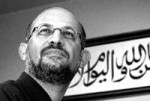University offered Al-Arian nearly $1 million to resign

USF officials negotiated a deal that would have paid former USF professor Sami Al-Arian nearly $1 million to resign during the time after his paid suspension but before the U.S. government arrested him on charges of terrorism.
Al-Arian revealed the arrangement Wednesday during a conversation with radio host Amy Goodman on her news and public affairs program, Democracy Now!
Al-Arian, who spoke with Goodman from a Virginia prison, said the offer was made at the end of August 2002 and was retracted several days later after former Board of Trustees Chair Dick Beard voiced objections.
Beard and Bob McKee, Al-Arian’s former employment attorney, confirmed that USF President Judy Genshaft and University lawyers proposed a secret deal that offered between $920,000 and $930,000 to Al-Arian, according to an article in the St. Petersburg Times.
“It happened,” Beard said to the Times on Wednesday. “The president and the lawyers felt that they were doing something to end the problems with Al-Arian, but I objected because I saw it as a payoff.”
In a written statement, USF spokeswoman Lara Wade said Genshaft declined comment as part of University policy.
“As a matter of practice, the University does not comment regarding negotiations, if any, with former employees,” Wade said.
Al-Arian was suspended from his position as professor of computer science engineering after a series of death threats stemming from his September 2001 appearance on The O’Reilly Factor. During the show, host Bill O’Reilly accused Al-Arian of links to violent terrorist organization Palestinian Islamic Jihad. Al-Arian was placed on paid leave three days later.
On Feb. 26, 2003, the University fired Al-Arian after his arrest on a 50-count federal indictment for conspiracy to commit murder and providing material support to a terrorist organization.
Between his suspension and ultimate firing, heat from the American Association of University Professors spurred USF to put an end to the controversy by trying to cut a deal with Al-Arian, according to interviews with Beard and McKee in the Times.
“By late August, the media blitz was getting worse and worse,” McKee said to the Times. “The American Federation of Teachers was supporting Al-Arian. So was the American Association of University Professors. The school just wanted it to go away.”
The AAUP, an organization that advocates academic freedom and supports tenure rights, first took issue with USF after Genshaft composed a letter of intent to terminate Al-Arian with the consent of the BOT and had it delivered to his house in late 2001.
In April 2002, following its second visit to USF to investigate the situation, the committee spent 10 months writing a report condemning the University’s treatment of Al-Arian.
Al-Arian’s trial ended with a plea agreement in April 2006 after a jury acquitted him on eight of 17 charges, including conspiracy to maim and murder people abroad and providing material support to a terrorist organization. However, the jury deadlocked on the other nine charges.
Al-Arian is being held in contempt of court in Virginia for his refusal to testify in a case on whether Islamic charities funneled money to terrorist organizations. Al-Arian has said he fears his testimony would endanger his life after he is deported as part of his plea agreement.
Al-Arian spoke with Goodman about the hunger strike he began Jan. 22 to protest his continued detainment, which Al-Arian and international rights groups have called a violation of his plea agreement and a trampling of his human rights.






